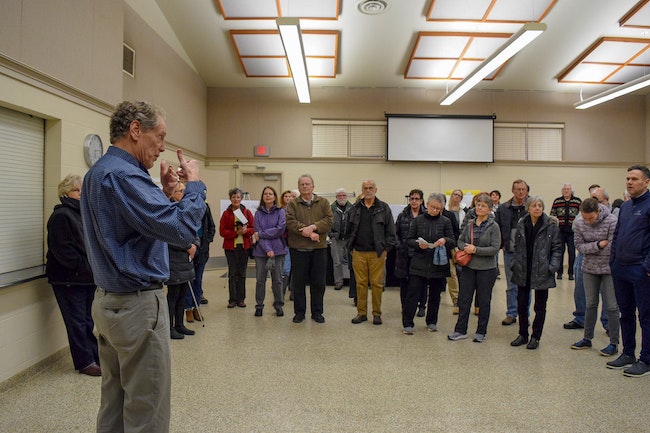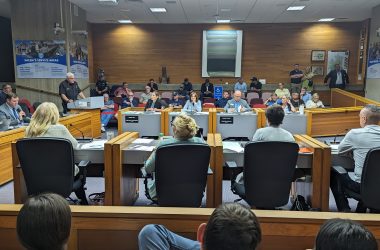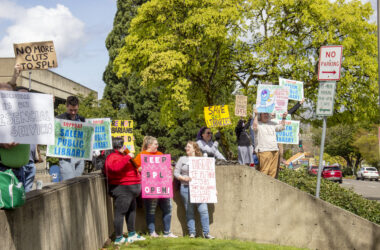 Councilor Tom Andersen responds to questions from the a crowd of neighbors at Pringle Community Hall. Salem City Council on Tuesday walked away from plans to turn the hall into an emergency homeless shelter. (Saphara Harrell/Salem Reporter)
Councilor Tom Andersen responds to questions from the a crowd of neighbors at Pringle Community Hall. Salem City Council on Tuesday walked away from plans to turn the hall into an emergency homeless shelter. (Saphara Harrell/Salem Reporter)
For the past six weeks, Salem officials and nonprofit leaders have had one major focus: bring more emergency shelter beds to the city’s homeless residents.
Homeless residents have congregated on downtown sidewalks since early December after council banned public camping. Separately, searches for a building to turn into shelter repeatedly came up short.
Yet, with a plan teed up Tuesday night to turn Pringle Community Hall in southeast Salem into a 37-bed shelter, Salem City Council opted out. The shelter would have lasted about 10 weeks.
Councilors instead set in motion a plan to temporarily allow public camping in certain parts of town. They will allow a 10-bed women’s shelter to add nine extra beds and the city will start developing a pilot program to help people who live in their cars find a place to park and sleep.
Council also ordered a report on zoning changes that could make other buildings available as a shelter.
READ: Salem declares state of emergency homelessness, but scraps shelter plan
The course correction was sudden enough to surprise councilors themselves.
“I came here fully intending on supporting opening Pringle Hall. That was my intention,” said Councilor Chris Hoy during the meeting, minutes after he moved to scrap that plan.
So what changed?
The change occurred after lengthy testimony from frustrated neighbors and insights into homelessness by Jimmy Jones, executive director of the Mid-Willamette Valley Community Action Agency.
Many neighbors who live near Pringle Community Hall, at 606 Church St. S.E., worried the shelter would bring more bad behavior and property damage.
Brent Koester, who lives across the street from the proposed shelter, said he’s been accosted three times on his own property by homeless residents, extinguished fires under a nearby bridge and fetched stolen shopping carts.
“I’ve gotten real good at recognizing shopping carts,” he said, presenting a slideshow of litter, vacated campsites and needles. “I’ve taken so many shopping carts back to the stores. I know the shopping cart store by the color of the handle.”
Neighbors largely tried to balance compassion for homeless residents with frustration with the city’s actions since December.
“The city displaced people without a plan,” one woman said while opposing the shelter. “We know we are in this together and we know we are better than this lack of planning.”
Jones followed with statements that, in fact, helped set the council’s new course. Hoy asked Jones what he would do if he were in the council’s position.
“My advice would be to repeal the camping ban in industrial areas of town so that there would be a place where people could safely camp without the impact on commercial and residential areas in the city,” he said.
Jones outlined the lack of a one-size-fits-all solution for homelessness. A shelter may work for some, but others may never use it, he said. Likewise, some need physical medical care while others need mental health counseling and others need substance abuse treatment.
Besides partially repealing the camping ban, Jones did rattle off some immediate ways to make a dent.
He said Salem needs a navigation center, essentially a short-term shelter that specializes in getting people housed. A state report last August came to the same conclusion.
READ: Salem needs ‘navigation center’ for homeless, state-backed report said.
Jones added Salem should buy a former state Department of Human Services building in southeast Salem that would cost $3.5 million. He said the building could shelter up to 125 people every night and complement the city’s warming shelter network — but it may need to be rezoned.
When Hoy asked Jones how Pringle Hall would fit into any plans to manage homelessness, Jones said it would help some people at night but people downtown won’t notice a difference.
“We might keep some folks from dying outside between now and the end of March,” he said. “But in terms of a visual impact of what we see in the downtown, it’s not going to have much of an impact at all.”
Hoy ultimately moved to scrap Pringle Hall from the city’s plan for homelessness, citing Jones’ testimony.
“We seem like we’re wandering our way through this situation and we’re trying to do what we think is best to help the situation,” he said. “We heard from our expert that Pringle Hall is not going to significantly impact the situation. And so, in my mind, if it’s not going to significantly help and we have a lot of neighbors who think it’s going to make their neighborhood worse, then it probably doesn’t make a lot of sense to do it.”
All seven councilors present — Cara Kaser and Jackie Leung were not present — voted for the new motion, with the Pringle Hall plan scrapped.
Councilor Jim Lewis dissented somewhat. He supported the motion but said he was disappointed in the turn of events.
“We talk and talk and talk about shelter for individuals and we’re turning down 37 spaces,” he said.
Have a tip? Contact reporter Troy Brynelson at 503-575-9930, [email protected] or @TroyWB.









